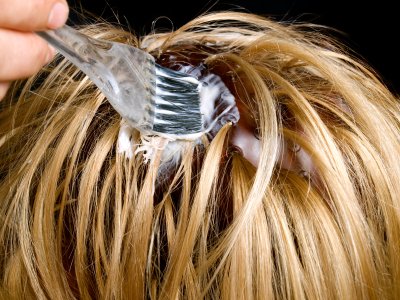Hydrogen peroxide also goes by the chemical name of hydrogen dioxide. It has a specific chemical formulation, which is H2O2. It has no color or odor and tastes a bit like bleach. You can get it anywhere for very little money. It breaks down into water and oxygen when exposed to other substances, which is why it fizzes when mixed with other agents. When the oxygen atom is released, it becomes very reactive and looks for another molecule to attach to. It turns out that our white blood cells make hydrogen peroxide to create an oxygen free radical that helps to destroy funguses, viruses, and bacteria.
Hydrogen Peroxide Uses
Warning: Hydrogen peroxide is best used when diluted. It can be harmful or even fatal if you consume the concentrated form of the product. Use eye protection and gloves when using the product. If you come in contact with a 35% solution or more, you can burn your skin. If this occurs, you need to flush the area with lots of cool water.
 For foot fungus. Hydrogen peroxide is effective against foot fungus. You just need to immerse your feet into a solution of hydrogen peroxide to soften your corns and calluses. It can cure athlete’s foot and disinfect lacerations as long as they are minor. Simply make a preparation of 50% H2O2 in water and allow your feet to soak in it at least once daily.
For foot fungus. Hydrogen peroxide is effective against foot fungus. You just need to immerse your feet into a solution of hydrogen peroxide to soften your corns and calluses. It can cure athlete’s foot and disinfect lacerations as long as they are minor. Simply make a preparation of 50% H2O2 in water and allow your feet to soak in it at least once daily.- Cleansing of minor wounds. Another of the hydrogen peroxide uses is in cleansing and helping to heal minor wounds caused by bacteria and fungi. You start with 3% H2O2 and mix it with water at 50%. You can also put it directly on the wound where it can clean out the wound. You need to dilute the H2O2 because full strength hydrogen peroxide can damage the healthy tissue. Rinse away the excess after soaking or applying the solution to the wound.
- Boosts the immune system. Many people don’t realize that we actually make H2O2 by the leukocytes, which are part of the immune system. As an immune system booster, it helps to get rid of toxins, viruses and bacteria.
 For washing vegetables. One of the hydrogen peroxide uses is to clean your vegetables so that they don’t contain pesticides or herbicides. You just need to put 5% hydrogen peroxide with water and spray them on the vegetables. After spraying, you just need to clean off the H2O2 using cold water before eating them.
For washing vegetables. One of the hydrogen peroxide uses is to clean your vegetables so that they don’t contain pesticides or herbicides. You just need to put 5% hydrogen peroxide with water and spray them on the vegetables. After spraying, you just need to clean off the H2O2 using cold water before eating them.
- As a purifier of water. Hydrogen peroxide can act as a purifier for water. You just need to add a pint bottle of H2O2 per gallon of water in steamers and purifiers. It keeps water safe to drink.
- As a household cleaner. A spray bottle of 5% hydrogen peroxide can be used to apply to household surfaces in order to get stains removed off the surfaces. Rinse the area after using.
 As a mouthwash. H2O2 can be used as a 5% solution to clean out your mouth. You can gargle with it but should spit it out without swallowing.
As a mouthwash. H2O2 can be used as a 5% solution to clean out your mouth. You can gargle with it but should spit it out without swallowing.- Whitening clothing. One of the hydrogen peroxide uses is to keep your clothes white. It is a good stain remover for white clothing. It can easily remove blood from light-colored clothing, such as paramedic shirts. You just need to put in a half cup or whole cup of hydrogen peroxide when washing white clothing.
- As an aquarium cleanser. You can get rid of algae and debris from the elements inside the aquarium as well as on the inside wall of the aquarium. Be sure to rinse off the items you cleaned as fish don’t tolerate it. You can get rid of fungus when used sparingly on your aquarium components as long as you wash it off.
 As a hair bleach. H2O2 has been used to dye hair and lighten it naturally. You just need to spray a 50% mixture with hydrogen peroxide (3%) in order to lighten the hair. First wash your hair and comb the mixture into the hair and allow it to dry. It gradually allows the hair to lighten; you might need to put more H2O2 on your hair every couple of days to get the amount of lightening you want.
As a hair bleach. H2O2 has been used to dye hair and lighten it naturally. You just need to spray a 50% mixture with hydrogen peroxide (3%) in order to lighten the hair. First wash your hair and comb the mixture into the hair and allow it to dry. It gradually allows the hair to lighten; you might need to put more H2O2 on your hair every couple of days to get the amount of lightening you want.
Watchthis video to learn more uses of hydrogen peroxide.
Precautions about Using Hydrogen Peroxide
Possible Side Effects
There are possible side effects when using H2O2. For example, it may cause irritation, stinging, or redness anywhere you apply it. You need to stop taking the hydrogen peroxide if there are skin infections symptoms like tenderness, heat to the affected area, and purulence. Rarely, you can have a severe allergic reaction to the medication. If severe, you should seek medical advice.
Storage of H2O2
While taking advantage of hydrogen peroxide uses, you need to keep this product away from children and store it in a glass container unless it comes with a specially coated plastic container. It should be refrigerated or at least sealed tightly in a cool and dried place. Put a label on the container to identify the substance and to indicate that it might be dangerous.
Sleep Problems When Taking H2O2
If you take hydrogen peroxide right before sleeping, it can cause insomnia or difficulty getting to sleep. This is because it supplies excess oxygen to the cells of the body. If taken internally, make sure it doesn’t burn your esophagus. If it happens, check to see that you have used the correct dilution recommendations. Stop using it if you still experience burning pain.
